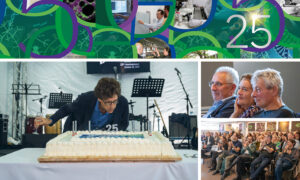EMBL coordinates new Marie Curie Research Training Network “Chromatin Plasticity”
The European Commission has awarded 3.7 Million Euro under the European Union Framework 6 Programme over the next four years to a new Marie Curie Research Training Network, coordinated by Dr. Andreas Ladurner at the European Molecular Biology Laboratory (EMBL).
The long molecules of DNA that carry our genetic information are wrapped up together with proteins into a dense complex called chromatin. The structure of chromatin is dynamic and varies according to different phases of a cell’s life, a phenomenon that is called chromatin plasticity. Chromatin structure plays a critical role in regulating our genes and research in this area has the potential to aid the understanding of biological processes and disease, including aging and cancer.
The “Chromatin Plasticity” Network brings together 13 academic and industrial research groups from 9 countries around the world to reveal novel mechanisms in the regulation of chromatin structure. Combining complementary approaches from disciplines as different as structural biology, mouse genetics, immunology, bioinformatics and drug design, the research partners are aiming to develop new approaches and tools to achieve a thorough understanding of chromatin plasticity, as well as to identify potential therapeutic targets for cancer and heart disease.
In this project, great emphasis is placed on training PhD students and postdoctoral researchers through collaborative exchanges, practical courses and visits within the network, contributing to the development of the next generation of European researchers.
Project Web Site: www.chromatin-plasticity.org



